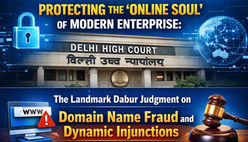Calcutta HC shakes up trademark world! 📚⚖️ Court rules Associate Managers can't make quasi-judicial decisions
- NLF TAX & LEGAL
- Aug 17, 2024
- 5 min read
The Hon'ble High Court at Calcutta in three appeals (IPDTMA No. 82 of 2023, IPDTMA No. 83 of 2023, and IPDTMA No. 1 of 2024) set aside and quashed orders passed by Associate Managers of Trade Marks, holding that they were not empowered to pass quasi-judicial orders under the Trade Marks Act, 1999.
Facts of the Case:
The High Court at Calcutta heard three appeals together: IPDTMA 82 of 2023, IPDTMA 83 of 2023, and IPDTMA 1 of 2024. The first two appeals were filed by Visa International Ltd. against orders dated September 16, 2023, passed by Shraman Chattopadhyay, Associate Manager of Trade Marks, in oppositions filed against trademark application No. 1363190 in Classes 06 and 35. The third appeal was filed by Garden Silk Mills Private Limited against an order dated October 6, 2023, passed by Saurabh Dubey, Associate Manager of Trade Marks, in an opposition filed against application No. 1536319 for registration of the mark "HANDLOOM GARDEN" (Device) in Class 35.
The appellants challenged these orders on the ground that the Associate Managers of Trade Marks who passed the impugned orders were neither authorized under law nor competent to pass such orders. The appellants' counsel presented evidence showing that Shraman Chattopadhyay was appointed as Hearing Officer on a contract basis only until March 31, 2023, but had passed orders on September 16, 2023. They also argued that Associate Managers were not assigned powers to conduct hearings and adjudicate matters according to a June 9, 2023 order.
The respondents, on the other hand, argued that Hearing Officers were appointed on a contractual basis through a proper process, including a public notice and walk-in interview. They presented office orders showing the delegation of functions to contractual manpower and the appointment of Saurabh Dubey as Associate Manager. The respondents' counsel also argued that attending and participating in proceedings with full knowledge amounts to acquiescence.
The court was presented with various documents, including appointment orders, organizational structures, and recruitment rules of the Trade Marks Registry. The key issue before the court was whether Associate Managers of Trade Marks are empowered to pass quasi-judicial orders under the Trade Marks Act, 1999.
Issue:
Whether Associate Managers of Trade Marks are empowered to pass quasi-judicial orders under the Trade Marks Act, 1999?
Held by the Court:
The Hon'ble High Court at Calcutta in IPDTMA No. 82 of 2023, IPDTMA No. 83 of 2023, and IPDTMA No. 1 of 2024 held that:
The Court observed that under Section 3 of the Trade Marks Act, 1999, the Controller-General of Patents, Designs and Trade Marks is the Registrar of Trade Marks. It held that other officers appointed by the Central Government to exercise the function of the Registrar should undertake such functions only if they are authorized by the Registrar. The Court noted that the power vested in the Registrar of Trade Marks under the Act is quasi-judicial in nature, as established in the case of Intellectual Property Attorneys Association v. Union of India & Ors.
The Court opined that the expression "other officers" in Section 3(2) of the Act indicates that they should be from the cadre of officers. While it held that the Central Government may appoint officers of any designation to perform the functions of the Registrar, these functions are to be performed under the superintendence and direction of the Registrar. The Court observed that quasi-judicial functions are required to be performed independently and not subject to the superintendence or direction of any other person, including the Registrar. It interpreted that Section 3(2) is only intended to empower the delegation of administrative power and not quasi-judicial power.
The Court found that Shraman Chattopadhyay's engagement as Associate Manager was only until May 31, 2023, but he passed orders on September 16, 2023. It noted that the respondents failed to produce any order extending his engagement beyond May 31, 2023. The Court also observed that the Recruitment Rules of the Trade Marks and Geographical Indication Registry (2011) do not include the post of Associate Manager.
Based on these findings, the Court concluded that Associate Managers appointed under Section 3(2) are not empowered to pass quasi-judicial orders. Consequently, it set aside and quashed the impugned orders passed by Shraman Chattopadhyay and Saurabh Dubey. The Court held that the matters should be remanded to the Registrar, Trade Marks to be decided afresh by a competent officer within six months, after giving an opportunity of hearing to all parties.
The Court emphasized that its decision was based solely on the issue of whether Associate Managers are entitled to pass quasi-judicial orders, and not on the merits of the trademark oppositions. It clarified that the Registrar dealing with an application under the Trade Marks Act is exercising quasi-judicial power, and delegation of power under Section 3(2) is administrative in nature.
The Court also addressed the respondents' argument about the maintainability of the appeal under Section 91 of the Trade Marks Act, 1999. It held that the appeal was maintainable, as the issue of competence to pass the order goes to the root of the matter. The Court relied on various judgments to support its interpretation of the Trade Marks Act and the nature of quasi-judicial functions, including J.K. Medical System Private Limited & Ors. v. Union of India & Ors. and The Registrar Trade Marks & Anr. v. Kumar Ranjan Sen & Ors.
Key Arguments by Lawyers:
Appellants' Counsel (Mr. Debnath Ghosh):
1. Argued that Associate Managers were not authorized or competent to pass quasi-judicial orders.
2. Presented evidence of Shraman Chattopadhyay's limited contractual appointment.
3. Highlighted the absence of Associate Manager position in the Trade Marks Registry's organizational structure and Recruitment Rules.
4. Cited case law on inherent lack of jurisdiction and void orders.
Respondents' Counsel (Mr. Ranjan Bachawat):
1. Argued that the appeal under Section 91 was not maintainable if the appellants believed the officer was not competent.
2. Presented evidence of proper appointment processes for Hearing Officers and Associate Managers.
3. Cited case law on the interpretation of statutes and the validity of actions taken under legal authority.
4. Argued that attending and participating in proceedings with full knowledge amounts to acquiescence.
Relevant Sections:
Section 3 of the Trade Marks Act, 1999
Section 2(2)(d) of the Trade Marks Act, 1999
Section 18(4) and 18(5) of the Trade Marks Act, 1999
Section 91 of the Trade Marks Act, 1999
Pari Materia:
1. J.K. Medical System Private Limited & Ors. v. Union of India & Ors. (Manu/TN/5856/2023): Interpreted Section 3 of the Trade Marks Act, holding that the Act does not impose fetters on the power of the Central Government to appoint and authorize officers of any designation to undertake quasi-judicial functions.
2. Intellectual Property Attorneys Association v. Union of India & Ors. (2014 SCC OnLine Del 1912): Held that the power vested in the Registrar of Trade Marks under the Trade Marks Act is quasi-judicial in nature.
3. The Registrar Trade Marks & Anr. v. Kumar Ranjan Sen & Ors. (1965 SCC OnLine Cal 33): Discussed the administrative superintendence and direction of the Registrar over other officers exercising his powers.
4. N. Mani v. Sangeetha Theatre & Ors. (2004) 12 SCC 278: Established that if an authority has power under the law, merely not referring to the source of power or referring to a wrong provision does not vitiate the exercise of power.

































Comments